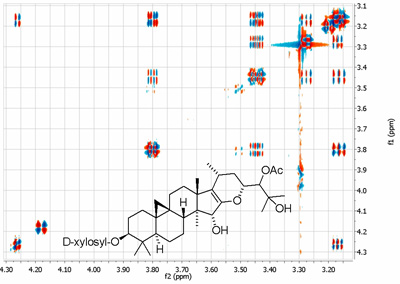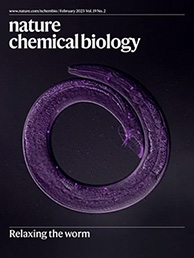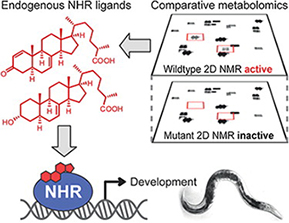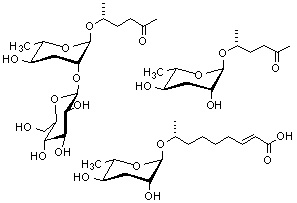|
Schroeder Lab Boyce Thompson Institute and
Department of Chemistry and Chemical Biology Cornell University Graduate student and postdoc postions available. Click Join for details
Group meeting: Tuesdays 5pm, BTI 215.
|
Our research is directed at characterizing structures and biological functions of biogenic small molecules (BSMís). BSMís play important roles in most biological processes, and detailed knowledge of their chemical structures and their interactions with other biomolecules is essential for advancing our molecular understanding of life. BSMís regulate development and immune responses in plants and animals, and serve important functions in interactions of different organisms with each other. As a result, an organism's metabolome essentially comprises a collection of small molecules with potentially useful affinities for specific molecular targets. Not surprisingly, BSMís constitute the most important source of lead structures for drug development.
Compared to template-derived biological macromolecules such as proteins and nucleic acids, BSMís are chemically much more diverse and correspondingly present great analytical challenges. As a result, genomic and proteomic knowledge has not yet been complemented by a comprehensive characterization of structures and functions of metabolomes, presenting one of the most significant barriers toward advancing our understanding of biological pathways.

The Schroeder lab aims to help close this knowledge gap by developing approaches for a more systematic structural and functional characterization of BSMís. Usually, BSMís occur as - often minor - components of a more or less complex biological matrix, comprising a large number of BSM's and other biomolecules. Traditional approaches for the characterization of BSM's such as HPLC-MS or activity-guided fractionation have distinct disadvantages that severely limit their applicability. Our aim is to develop innovative approaches that complement or enhance traditional methodology by enabling detailed characterization of BSMís in complex biological samples, with regard to both chemical structure and biological function.
Based on combining comparative metabolomics with genetic approaches, we have engaged in a comprehensive effort to characterize structures and functions of the metabolome (the entirety of all BSMs) produced by the model organism Caenorhabditis elegans, focusing on several newly discovered compounds that control development, aging, and several social behaviors. Our research has led to the identification of several hundred new BSMs in C. elegans and other nematodes, including parasitic species. These new metabolites are derived from modular assembly of building blocks from all major metabolic pathways, presenting a new paradigm of small molecule biosynthesis in metazoans. Many of these compounds have entirely unexpected structures and biological activities, and current efforts in the lab focus on the elucidation of the biosynthesis of these compounds and their role in regulating conserved endocrine (steroid hormone) signaling. Complementing our interests in analytical chemistry, we pursue development of efficient synthetic approaches for newly identified compound classes with particular biological significance.
Please visit our research pages for more details!
The latest news about the Schroeder lab can be found here.






